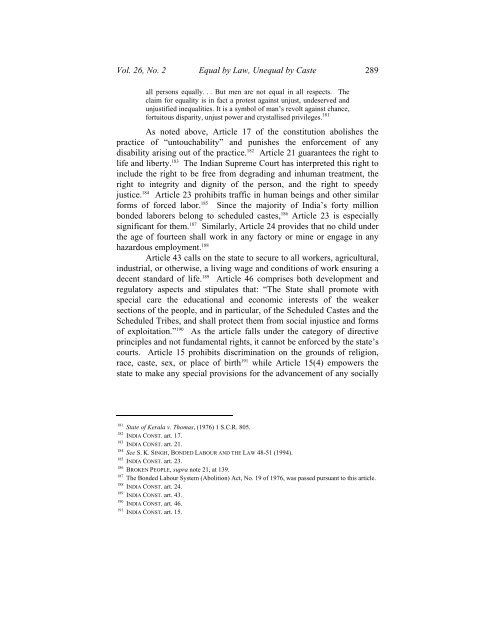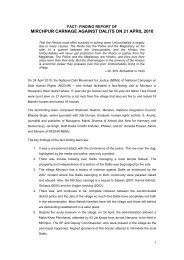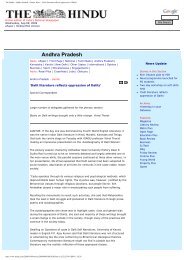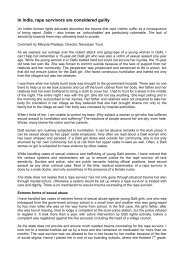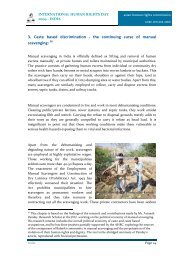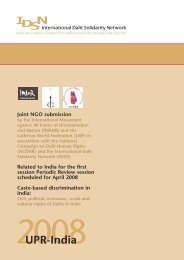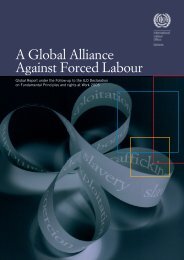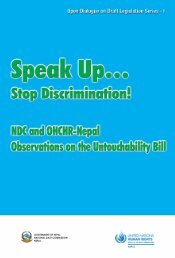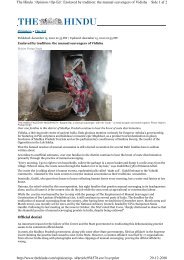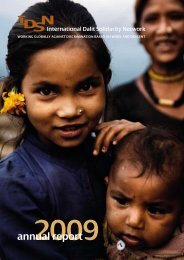equal by law, unequal by caste - International Dalit Solidarity Network
equal by law, unequal by caste - International Dalit Solidarity Network
equal by law, unequal by caste - International Dalit Solidarity Network
You also want an ePaper? Increase the reach of your titles
YUMPU automatically turns print PDFs into web optimized ePapers that Google loves.
Vol. 26, No. 2 Equal <strong>by</strong> Law, Un<strong>equal</strong> <strong>by</strong> Caste 289all persons <strong>equal</strong>ly. . . But men are not <strong>equal</strong> in all respects. Theclaim for <strong>equal</strong>ity is in fact a protest against unjust, undeserved andunjustified in<strong>equal</strong>ities. It is a symbol of man’s revolt against chance,fortuitous disparity, unjust power and crystallised privileges. 181As noted above, Article 17 of the constitution abolishes thepractice of “untouchability” and punishes the enforcement of anydisability arising out of the practice. 182 Article 21 guarantees the right tolife and liberty. 183 The Indian Supreme Court has interpreted this right toinclude the right to be free from degrading and inhuman treatment, theright to integrity and dignity of the person, and the right to speedyjustice. 184 Article 23 prohibits traffic in human beings and other similarforms of forced labor. 185 Since the majority of India’s forty millionbonded laborers belong to scheduled <strong>caste</strong>s, 186 Article 23 is especiallysignificant for them. 187 Similarly, Article 24 provides that no child underthe age of fourteen shall work in any factory or mine or engage in anyhazardous employment. 188Article 43 calls on the state to secure to all workers, agricultural,industrial, or otherwise, a living wage and conditions of work ensuring adecent standard of life. 189 Article 46 comprises both development andregulatory aspects and stipulates that: “The State shall promote withspecial care the educational and economic interests of the weakersections of the people, and in particular, of the Scheduled Castes and theScheduled Tribes, and shall protect them from social injustice and formsof exploitation.” 190 As the article falls under the category of directiveprinciples and not fundamental rights, it cannot be enforced <strong>by</strong> the state’scourts. Article 15 prohibits discrimination on the grounds of religion,race, <strong>caste</strong>, sex, or place of birth 191 while Article 15(4) empowers thestate to make any special provisions for the advancement of any socially181 State of Kerala v. Thomas, (1976) 1 S.C.R. 805.182 INDIA CONST. art. 17.183 INDIA CONST. art. 21.184 See S. K. SINGH, BONDED LABOUR AND THE LAW 48-51 (1994).185 INDIA CONST. art. 23.186 BROKEN PEOPLE, supra note 21, at 139.187 The Bonded Labour System (Abolition) Act, No. 19 of 1976, was passed pursuant to this article.188 INDIA CONST. art. 24.189 INDIA CONST. art. 43.190 INDIA CONST. art. 46.191 INDIA CONST. art. 15.


